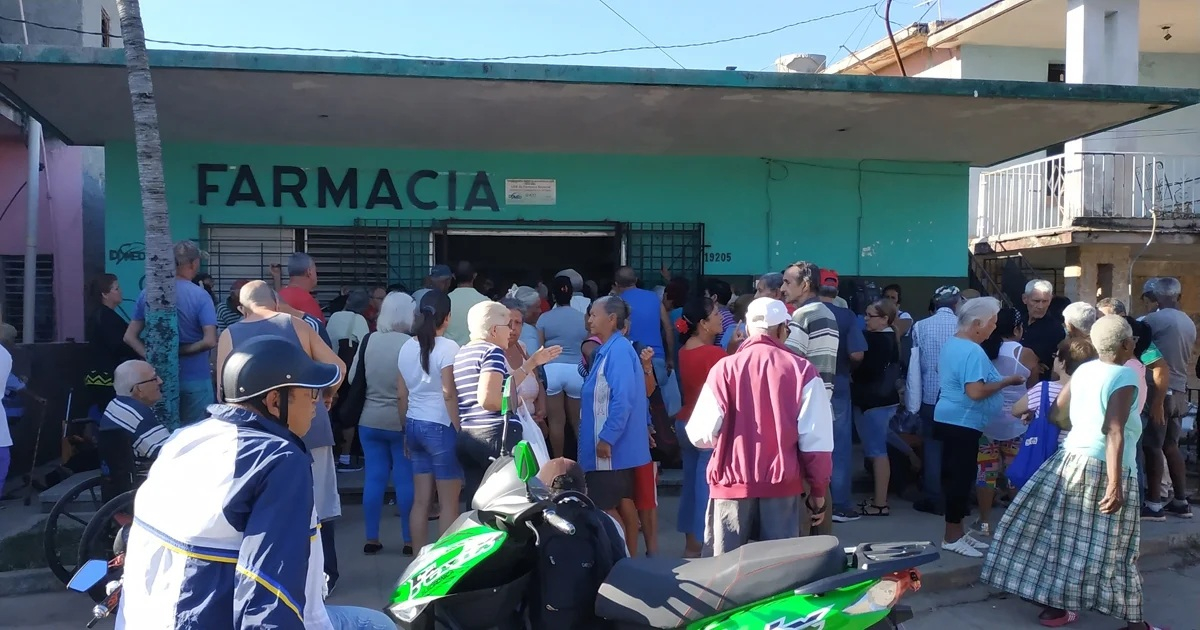
Related videos:
The supply crisis in Cuba has prompted the government to intensify the rationing of medications amid a situation characterized by inadequate supply.
The scarcity, attributed by the authorities to external conditions, has led to long lines in all the provinces of the country. Patients with chronic illnesses, such as hypertension, diabetes, and asthma, are facing serious difficulties in accessing their treatments, which puts their health at risk.
In an effort to optimize distribution and ensure greater equity in access to available medications, a new sales method has been implemented at pharmacies in the province of Camagüey.
According to the local newspaper Adelante, this system assigns specific days for the purchase of medications, based on each medical office.
Furthermore, a sales period is established that varies between six and seven days, depending on the number of clinics serviced by each pharmacy.
Once the coverage of all the offices is complete, the sales cycle restarts in the order of arrival.
After the receipt of medications in each distribution cycle, the pharmacy manager will inform local authorities and medical personnel, so that the population can attend according to the schedule, said Maurilis Acosta Nápoles, head of the pharmaceutical services section of the General Directorate of Public Health in the province.
The quantities available for sale to each patient will depend on the coverage received and the regulations established for each type of medication.
According to the official, this model includes all medications but specifically focuses on controlled substances that require stricter management.
"This is the case for medical emergencies; the individual, whether or not they belong to the office where they are purchasing, has the right to receive, as long as there is availability, the medication, whether at a main pharmacy, a specialized area pharmacy, or a community pharmacy,” he pointed out.
The shortage of medications in Cuba has reached critical levels in recent years, severely affecting the population, especially patients with chronic illnesses and the elderly. According to official reports, more than 70% of essential drugs are unavailable, which amounts to over 460 medications from the basic list.
This situation has forced many Cubans to resort to the black market, where the prices of medications have skyrocketed. For example, a bottle of amoxicillin can cost up to 300 pesos in the informal market.
Additionally, there have been reports of people sleeping outside pharmacies to secure a spot in the long lines and be able to acquire the few medicines available.
Cuban authorities have acknowledged the seriousness of the shortages. In July 2024, the Minister of Public Health, José Ángel Portal Miranda, reported that the shortage of medications would continue due to funding issues and difficulties in acquiring raw materials.
This crisis not only affects patients who require systematic treatments, but it has also increased the illegal resale of medications, further exacerbating the issue.
In response to the crisis, the Cuban government has implemented measures such as the extension of the tariff exemption for the importation of food, hygiene products, and medicines by travelers arriving from abroad.
However, these actions have not been sufficient to alleviate the shortage, and the population continues to face serious difficulties in accessing essential medications.
Frequently Asked Questions about the Drug Shortage in Cuba
What is the current situation regarding the shortage of medicines in Cuba?
The situation is critical, as more than 70% of essential medications are unavailable, which amounts to over 460 medicines from the essential list. This shortage severely impacts the population, especially those suffering from chronic illnesses and the elderly.
What measures has the Cuban government implemented to address the shortage of medications?
The government has implemented a new method for rationing medications in pharmacies, assigning specific days for purchases based on each medical clinic. Additionally, the tariff exemption for medications for travelers from abroad has been extended. However, these measures have not been enough to resolve the crisis.
How does the shortage of medications affect patients with chronic diseases in Cuba?
The shortage of medications puts the health of patients with chronic diseases such as hypertension, diabetes, and asthma at risk, as they face serious difficulties in accessing their treatments. This situation has forced many to turn to the black market, where medication prices are significantly high.
What alternatives do Cubans have in the face of the lack of medications in pharmacies?
Due to the shortage of medications in pharmacies, many Cubans are forced to turn to the black market, where prices are significantly higher. Additionally, some attempt to import medications through travelers from abroad, taking advantage of the temporary tariff exemption.
Filed under: